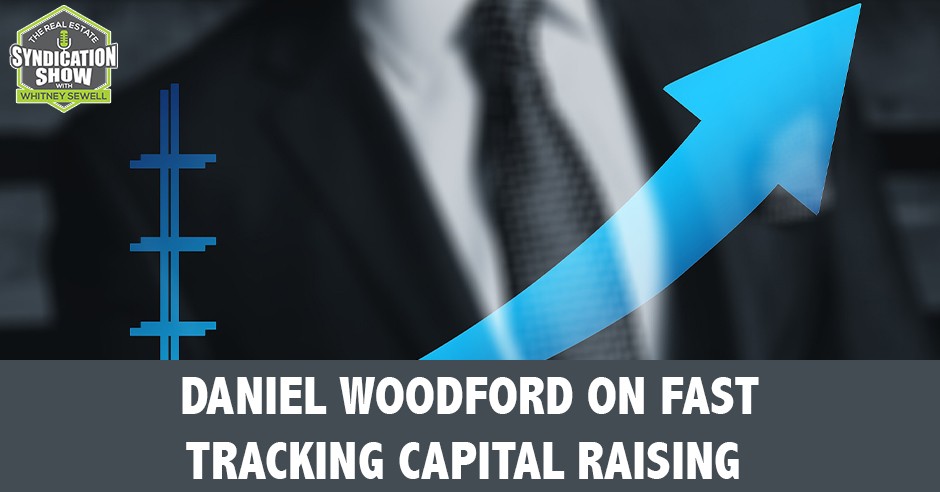
Listen to the podcast here:
People are struggling to raise capital fast. Daniel Woodford, a seasoned multifamily investor, entrepreneur, and co-founder of Mission Bay Capital Partners explains what capital raising is all about. Daniel shares how they have been successful in raising capital from their first webinar as well as how they’re doing it now. He also talks about using portals and how that’s changed and improved the way they operate in raising capital and communicating with investors.
Our Gracious Sponsor:
Are you wanting to learn how to gain financial freedom through having your own syndication business? Text LEARN to 474747 to begin to learn from one of the best in the industry, Vinney Chopra. Vinney came to the US with only $7 in his pocket, and now controls hundreds of millions of dollars of real estate he has acquired through multifamily syndication. He is now personally coaching others to do the same. Text LEARN to 474747 to begin your journey to starting your own syndication business! Vinneychopra.com
—
Watch the episode here:
Listen to the podcast here:
Daniel Woodford on Fast Tracking Capital Raising
Our guest is Daniel Woodford. Thanks for being on the show, Daniel.
Thanks for having me, Whitney. I appreciate it.
I’ve been pleased to get to know Daniel a little bit. We’ve seen in different conferences and we’ve gotten to talk and I’m pleased to know him. He is making big things happen in this industry and he’s done a lot. He’s the Principal at Mission Bay Capital Partners focused on raising capital for the purposes of funding medium to large scale multifamily projects throughout the United States. He’s an experienced real estate acquisitions and development professional specializing in multifamily mixed-use assets in emerging markets. He manages all investment activities including acquisitions, capital sourcing, asset management, and disposition. Daniel, thank you again for your time and sharing your expertise with the audience. Can you tell them a little bit more about who you are, who Mission Bay is and dive into a very important topic in this industry?
I’m Daniel Woodford with Mission Bay Capital Partners. It is an organization that we put together to specifically raise capital for multifamily investments. My partner is Kristine Jefferson. She and I have been working diligently to set the foundation to be able to ramp up our capital raising efforts so that we can continue to invest in larger and larger multifamily deals. Not just larger and larger, but have the capability to invest in other investors deals and do that simultaneously. We’re excited about the platform that we’re putting together right now. We invest in multifamily properties throughout the mid-Atlantic. We also like a lot of areas in the Southeast and we also have some properties that we have in Texas. We work with a lot of acquisition partners and those acquisition partners are out. They help us find and source deals and then we help finance them. That’s one of the things that we’re excited about.
I know you’ve all been successful raising capital and I wanted us to hammer on that a little bit and focus on the raising capital portion of your business. Maybe you can elaborate on how you’ve all been successful. The way you do that now had probably changed from when you started it and you’ve probably grown a lot into that and you’re very experienced. Give us a start for somebody that’s getting started to raise capital, but some ways that things that you all do now that maybe you wish you had implemented when you started that the audience can.
It has changed since we started. Since we started with our first syndication, that was back in 2014. We syndicated a 98-unit deal. On that deal, we were raising $2 million and we had a challenge getting that deal across the finish line. I can remember being two weeks out and having several hundred thousand dollars still to raise and that was not fun. Fast forward to now where after bringing Kristine Jefferson onboard with us, we raised $2.5 million for a deal that we closed in Georgia. On the heels of that, because we put these systems in place and a lot of these systems were due to one of our other partners, Jon Lee, we were able to jump to the challenge of raising $8.5 million which we were able to accomplish and get that property. We’re almost done. We’re about a million or so shy right now but were able to get relatively close to that number in a short order of time. We’re excited about the fact that we’re able to raise the capital in that matter. We’re going to keep growing it from there.
There are not many people that can raise that kind of capital that fast. What’s contributed to that? What are some key things that’s helped you to go from struggling to raise $2 million to be almost $8 million?
I can attribute a lot to technology. We just implemented our new online portal. That does a couple of things for us. It makes us look a little bit more professional while dealing with investors. Investors are able to get online, see their positions, see what they’re investing in, see where the returns of distribution and that type of thing. They’re also able to get all of their documentation in one location. That’s one of the things that has benefited us. The other thing with the implementation of this portal is we’re able to do everything electronically and online with regards to the entire syndication process. From contacting our investors to providing them with a webinar, to signing documents to wiring funds. All of that is done within our portal. That’s something that’s streamlined what we do.
From time to time, we have what we call acquisition partners that help us with raising capital or acquisition partners or some called capital raisers. They help us and assist us with raising capital. One of the things that we’re able to do with our portal is that we’re able to brand that company or that individual with a portal of their own. We put their logo on our portal. It appears as if it’s their portal, which it is. It is their portal. They’re able to communicate exactly the same fashion that we are with their investors. It makes them look very professional and a lot of our capital raisers like that aspect. That has helped us jumpstart our capital raising business also.
[bctt tweet=”Choose a platform that’s simple, straightforward, and fits with your business plan. ” via=”no”]
You weren’t doing everything electronically when you were first getting started. You were pushing those paper and you were printing out all of the subscription agreements and mailing them or emailing and hoping they mail it back to you. That takes a long time to track all that.
It takes a long time to track that. Within the portal, it tracks all of that from start to finish. We can pinpoint exactly where everyone is within the acquisition process and communicate with them very directly. One of the biggest aspects of our investors is everybody is busy. Everybody is busy in this day and age. It’s either they have families, work life and that type of thing. We’re removing that aspect of having to print out a subscription agreement. Ours is about twenty pages or so and having to read that, having to sign it, scan it back and email that. That’s a challenge and we’ve removed that hurdle from individuals so that they can easily get into and be a part of our syndication.
How did you select this specific platform? It’s a big step to sign up with somebody like that. How did you select them? What are some pros or cons that allowed you to eliminate and say, “This is the one we’re going to pursue?”
We evaluated several platforms and one of the main criteria was usability for our investors. We wanted it to be simple, we wanted it to be straight forward, we wanted it to be clean and then also, we wanted it to fit our business plan. One of our business plans is to be able to also raise capital with our acquisition partners or capital raisers. We wanted a platform that would manage that process and then we also selected a portal that is relatively small. They don’t have a large clientele so we’re able to talk directly to the developer with regards to this portal. In fact, we are able to massage it and give feedback on the portal and suggestions on what can be done to add features to the portal and we get that real time. They’re able to update the portal real time so it’s almost like we’re getting our own portal here. Those are the main criteria that we looked at.
When would you say that someone is ready to use a portal like that or to make that step of that kind of investment?
There is an investment involved. I would say after a couple of syndications when you’ve built up a network or a database of investors for at least 50 to 100, it probably makes sense at that point. I wouldn’t think it would be your first syndication, but after, you’ll build up a network type of thing.
What are some other pieces of technology or something that you all have used to help raise capital?
The other thing that we do now and it’s not unique to us. We do webinars. We feel that webinars are an aspect that’s been very successful for us and giving the information to the individuals, which is the main point of it, but it also gets individuals excited about our property or our project. A lot of times from a webinar, we were able to get individuals to commit fairly quickly, which is the goal to get them the information, get them excited, and get them to commit. On our very first webinar, Kristine and I would put the webinar together. There are about twelve or fourteen people on the webinars, so we said, “This is pretty good. We’ve got a couple of people here. This is looking good.” We got to the end of the webinar and we didn’t have any questions. Kristine and I got off the webinar like, “This one is great or it was a complete flop.” We had no questions and then a day later we opened up our portal and we have over $1 million in commitments right after our webinar. That’s what we’ve implemented. I see a lot of great webinars out there.
What technology do you use to do the webinar specifically?

We started with Zoom and then we moved to another platform. I believe it’s called WebinarJam. Kristine leads up that entire process. She evaluated several different webinar providers and WebinarJam is what we use with this one.
What made that webinar so successful? You’ve all done many of these webinars now. What are some keys or some things that we need to think about when we’re doing our own webinars?
When we first started, one of the first webinars was figuring out the technology, not necessarily going into the webinar figuring out the technology and fumbling around. We made that mistake on one of our early webinars. We got through it and then we got better. That’s one of the things you should look at.
I heard mixed opinions about answering investor questions. You were talking about you all didn’t get any questions. Do you all leave that wide open for investors to ask questions during the webinar? Do they ask questions through WebinarJam or is it through email? How do you all manage that?
There’s a chat room that we use to manage that entire process. Our acquisition manager that’s running the entire platform for us as we’re doing this webinar, he will relay that question that comes to the chat room. There’s also an opportunity on the platform to click the button to raise your hands. We also are able to acknowledge investors that are able to ask us directly their questions.
You use the WebinarJam and you’re doing a webinar. Are your webinars mostly for raising the capital to present the deals or are you also doing any webinars even after you closed?
We have not done any webinar after we closed. We present the deal to our investors. It’s one of the things that we’re looking at to add to what we do.
How are you preparing for the webinars? Is it slides that they’re seeing? Are they seeing you and Kristine?
They are slides. I purposely keep the video off of me. We have sets of slides that we presented to the investors.
[bctt tweet=”Own your own time and you’re going to be able to spend time with your family.” via=”no”]
Do you have any other pieces of technology that you all might use or tips for a webinar that you would give to somebody that’s getting started in presenting their deal to investors?
It is just understanding the platform. We dry run it several times to ensure that it comes across smooth and professional. That’s what I think has worked for us.
That’s important to test it first. If you have 30 seconds to a minute with somebody and I’m sure you get this question as often as I do, getting started in the syndication business, what advice do you give them?
I’m a firm believer of two things and that is education. That’s the first thing. You don’t want to jump into syndication. It’s a complex process first of all, and it’s already complex enough. Doing it without some formal education or some guidance is challenging. From a credibility standpoint, I believe that individuals should partner with someone who has done it before. If you’re starting and you want to jump into a 200-unit building, it’s very difficult to raise capital for something like that if you haven’t done it before or you don’t have credibility on your team in order to do that. One of the things that I did early on as I realized that I needed to bolster my resume so that I could be credible and have the experience.
The first thing I did was I got into a large deal with a large developer. It was a downtown reused building, 176 units, a 300,000 square foot tobacco factory that we were converting into loft-style apartments. When I say that to individuals, a lot of people think, “That’s an interesting project. That’s pretty cool.” I did that because I wanted to partner with somebody who knew the business, who I could leverage their resume and put that on my resume. All of a sudden, now I’ve got something that’s substantial on my resume and then business started growing from there. Partnering and education are the two biggest things.
What’s a way that you’ve improved your business that we can all apply to ours?
We’ve talked about it a little bit when I was adding the technology piece. I can’t think of anything else. I know that we’ve added more personnel to our company. Our company is growing. That’s one of those avenues that has made our company make a large step forward. Particularly in adding someone specifically, bringing on our partner with Kristin, specifically to raise capital and bring on Jon Lee. We have a financial analyst now that reviews all of our deals. We also have an avenue that we’re testing out right now. We have an avenue where individuals or investors can submit deals to us that our financial analysts will review to see if we are able to partner with that individual and help them in any way with regards to financing, with regards to raising capital, risk capital and that type of thing.
When you can start seeing the need to hire somebody and seeing your business grow, it’s a great feeling. You all are seeing that and you’re adding people like Kristine. We want to get her on the show. You’ve added Jon and then you’ve added somebody that’s doing more underwriting and analyzing deals.
We have several acquisition partners now that help us. When they find those deals, that’s something that we can review or we can look at. The return numbers are there and we partner with them to help finance and help them get it across the finish line.

Daniel, what’s the number one thing that’s contributed to your success?
It’s perseverance. One of the other main reasons is a big cliché or overstated sometimes, but it’s the reason why. I worked for the government. I was in the military and I loved being in the military. The last few years of my life, I spent two years commuting to work and two years commuting back. I live in LA and I worked at Washington, DC. I couldn’t afford to live anywhere near the base so it was a large commute for me. I was like, “I’m never going to do this again. I’m going to own my own time and I’m going to be able to spend time with my family.” That’s what drives me.
Thank you for your service. How do you like to give back?
I do a lot of things with veteran type organizations. I’ve done this once. I’ve done a 25-mile bike ride to support our local veterans here in Washington, DC area. It was painful on the first one and hopefully, I’ll get a little bit better on my time. We’ll see how that goes. I like to support the veterans when I can.
Daniel, you’ve been a great guest. I appreciate you talking about how you’ve all been successful raising capital from that first webinar to how you’re doing it now and using a portal, how that’s changed, improved the way you all operate, raising capital and communicating with investors. Tell the audience how they can get in touch with you and learn more about your company.
Our website is www.MissionBayCP.com and my email address is Daniel@MissionBayCP.com.
Daniel, thank you again. I appreciate your time and sharing your expertise. I appreciate the audience being with us. I hope you’re with us every day and go to Life Bridge Capital and connect with me. Go to the Facebook group, The Real Estate Syndication Show so we can all learn from experts like Daniel and grow our businesses together. I hope you’re sharing the show and we will talk to you next time.
Thank you. I appreciate it.
Important Links:
- Daniel Woodford
- Mission Bay Capital Partners
- Zoom
- WebinarJam
- www.MissionBayCP.com
- Daniel@MissionBayCP.com
- The Real Estate Syndication Show – Facebook Page
About Daniel Woodford
 Experienced real estate acquisition and development professional specializing in multifamily and mixed-use assets in emerging markets. Manages all investment activities including acquisition, capital sourcing, asset management and disposition. Strong business development professional with a Master’s Degree focused in Real Estate Development (MRED) from George Mason University – School of Business.
Experienced real estate acquisition and development professional specializing in multifamily and mixed-use assets in emerging markets. Manages all investment activities including acquisition, capital sourcing, asset management and disposition. Strong business development professional with a Master’s Degree focused in Real Estate Development (MRED) from George Mason University – School of Business.
Love the show? Subscribe, rate, review, and share!
Join the Real Estate Syndication Show Community:



